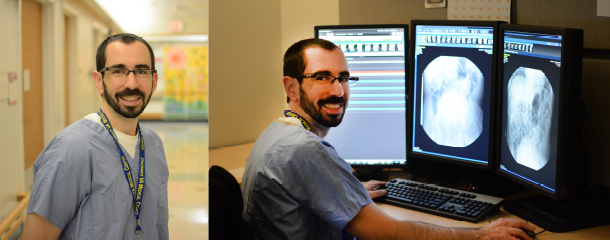

A radiology resident is a doctor who has been on a long journey of learning. After completing college and graduating from medical school, these doctors have worked in various clinical settings during an internship year. Now after over 9 years of schooling, radiology residents are able to focus their training in their chosen specialty and work to become experts in diagnosing and treating diseases using medical imaging such as CT, MRI, fluoroscopy, x-ray, nuclear medicine, and ultrasound.
To learn all the different aspects of radiology, residents rotate through multiple areas of radiology departments over a four-year period. The radiology residents working at Cincinnati Children’s are members of the University of Cincinnati Medical Center radiology residency program. As part of their training, they rotate through the radiology departments at the University of Cincinnati Medical Center (formerly called University Hospital), Cincinnati Children’s, and the Veterans Administration Hospital.
Residents learn the most advanced imaging techniques via supervised, on-the-job training. Additionally, radiology residents participate in educational activities, conferences with other medical specialists, and research projects. After completing the four years of required training and passing multiple qualifying examinations administered by the American Board of Radiology, radiology residents become board-certified radiologists.
Ultimately, the aim of every radiology resident is to focus all his or her previous training into the field of radiology in order to provide the best care possible for our patients.